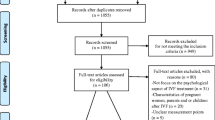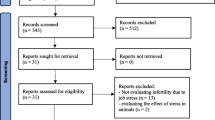Abstract
Purpose
Studies have shown mixed findings regarding the impact of stress on the success of fertility treatments. To the best of our knowledge, stress in the context of the workplace has not been investigated to date in relation to the success of fertility treatments. This research investigates the impact of work-related stress and emotional exhaustion experienced by both partners on in vitro fertilization (IVF) treatment outcomes.
Methods
We conducted a cross-sectional study that included 44 heterosexual couples (N = 88) in which both partners filled out the research questionnaire. The couples were recruited in a hospital IVF unit in the center of Israel.
Results
Women’s job-related stress and emotional exhaustion lowered their chances of achieving pregnancy when undergoing IVF treatments. Moreover, when partners’ emotional exhaustion was relatively low, the job-related stress of women did not affect pregnancy outcomes.
Conclusion
This is the first study to explore whether job-related stressors of both partners may have an impact on success rates of IVF treatments. We propose some practical implications as to how to eradicate their negative impact on IVF outcomes.


Similar content being viewed by others
Explore related subjects
Discover the latest articles and news from researchers in related subjects, suggested using machine learning.References
Pandya SP. Women undergoing IVF: mitigating anxiety and stress and building infertility self-efficacy and resilience through mindfulness care. Women’s Reprod, Health. 2024;11:130–51. https://doi.org/10.1080/23293691.2023.2206400.
Zanettoullis AT, Mastorakos G, Vakas P, Vlahos N, Valsamakis G. Effect of stress on each of the stages of the IVF procedure: a systematic review. Int J Mol Sci. 2024;25:726.
Csemiczky G, Landgren BM, Collins A. The influence of stress and state anxiety on the outcome of IVF-treatment: Psychological and endocrinological assessment of Swedish women entering IVF-treatment. Acta Obstet Gynecol Scand. 2000;79(2):113–8. https://doi.org/10.1034/j.1600-0412.2000.079002113.
Cesta CE. prospective investigation of perceived stress, infertility-related stress, and cortisol levels in women undergoing in vitro fertilization: influence on embryo quality and clinical pregnancy rate. Acta Obstet Gynecol Scand. 2018;3:258–68. https://doi.org/10.1111/aogs.13280.
Miller N, Herzberger EH, Pasternak AH, Shavit T. Yaniv, RT… Wiser A, Does stress affect IVF outcomes? A prospective study of physiological and psychological stress in women undergoing IVF. Reprod Biomed Online. 2019;39:93–101. https://doi.org/10.1016/j.rbmo.2019.01.012.
Boivin J, Griffiths E, Venetis CA. Emotional distress in infertile women and failure of assisted reproductive technologies: meta-analysis of prospective psychosocial studies. BMJ. 2011;342:d223. https://doi.org/10.1136/bmj.d223.
Chirico F. Job stress models for predicting burnout syndrome: a review. Ann Ist Super Sanità. 2016;52:443–56. https://doi.org/10.4415/ANN_16_03_17.
Ganster DC, Rosen CC. Work stress and employee health: a multidisciplinary review. J Manag. 2013;39:1085–122. https://doi.org/10.1177/0149206313475815.
Madsen IEH, Nyberg ST, Magnusson Hanson LL, Ferrie JE, Ahola K, Alfredsson L, Batty GD, Bjorner JB, Borritz M, Burr H, Chastang JF, de Graaf R, Dragano N, Hamer M, Jokela M, Knutsson A, Koskenvuo M, Koskinen A, Leineweber C, Niedhammer I, Nielsen ML, Nordin M, Oksanen T, Pejtersen JH, Pentti J, Plaisier I, Salo P, Singh-Manoux A, Suominen S, Ten Have M, Theorell T, Toppinen-Tanner S, Vahtera J, Väänänen A, Westerholm PJM, Westerlund H, Fransson EI, Heikkilä K, Virtanen M, Rugulies R, Kivimäki M, IPD-Work Consortium. Job strain as a risk factor for clinical depression: systematic review and meta-analysis with additional individual participant data. Psychol Med. 2017; 47: 1342–1356 https://doi.org/10.1017/S003329171600355X
Grotto AR, Angela R, Karen SL. The costs of today’s jobs: job characteristics and organizational supports as antecedents of negative spillover. J Voc Behav. 2010;76:395–405. https://doi.org/10.1016/j.jvb.2009.09.004.
Bacharach SB, Bamberger P, Conley SC. Work processes, role conflict, and role overload: the case of nurses and engineers in the public sector. Work Occup. 1990;17:199–228. https://doi.org/10.1177/0730888490017002004.
Demerouti E. The spillover and crossover of resources among partners: the role of work–self and family–self facilitation. J Occup Health Psychol. 2012;17:184. https://doi.org/10.1037/a0026877.
Bakker AB, Demerouti E. The spillover-crossover model. New frontiers in work and family research. East Sussex, UK: Psychology Press; 2013.
Cobb HR, Strasburg AE, Billeaud M, Rauvola RS, Thomas CL, Rudolph CW. Applying the actor-partner interdependence model to meta-analysis: a dyadic test of the spillover-crossover model for dual-income couples. Occup Health Sci; 2024. pp. 1–41. https://doi.org/10.1007/s41542-024-00195-x.
Bakker AB, Demerouti E. The spillover–crossover model, in current issues in work and organizational psychology. Routledge; 2018. pp. 140–152.
Kahn RL, Wolfe DM, Quinn RP, Rosenthal SJD, R.A. Organizational stress: studies in role conflict and ambiguity. New York: Wiley; 1964.
Bagozzi RP, Verbeke WJ. Genetic and psychological underpinnings of motivation and satisfaction of industrial salespeople. Ind Mark Manag. 2020;85:69–83. https://doi.org/10.1016/j.indmarman.2019.08.011.
Rajabi R, Boles J, Alejandro TGB, Sarin S. Revisiting and replicating the dominant logic on salesperson job satisfaction, organizational commitment, and turnover. J Bus Res. 2021;126:524–32. https://doi.org/10.1016/j.jbusres.2019.10.067.
Maslach C, Jackson SE. The measurement of experienced burnout. J Organ Behav. 1981;2:99–113. https://doi.org/10.1002/job.4030020205.
Bleil ME, Pasch LA, Gregorich SE, Millstein SG, Katz PP, Adler NE. Infertility outcomes program project group. Fertility treatment response: is it better to be more optimistic or less pessimistic? Psychosom Med. 2006;74(2):193–9. https://doi.org/10.1097/PSY.0b013e318242096b.
Devroe J, Peeraer K, D’Hooghe TM, Boivin J, Laenen A, Vriens J, Dancet EA. Great expectations of IVF patients: the role of gender, dispositional optimism and shared IVF prognoses. Hum Reprod. 2022;5:997–1006. https://doi.org/10.1093/humrep/deac038.
Gavrilov-Jerković V, Jovanović V, Žuljević D, Brdarić D. When less is more: a short version of the personal optimism scale and the self-efficacy optimism scale. J Happiness Stud. 2014;15:455–74.
Bayighomog SW, Ogunmokun OA, Ikhide JE, Tanova C, Anasori E. How and when mindfulness inhibits emotional exhaustion: a moderated mediation model. Curr Psychol. 2023;42:9080–94. https://doi.org/10.1108/JMD-06-2017-0207.
Hülsheger UR, Alberts HJ, Feinholdt A, Lang JW. Benefits of mindfulness at work: the role of mindfulness in emotion regulation, emotional exhaustion, and job satisfaction. J App Psychol. 2013;98:310. https://doi.org/10.1037/a0031313.
Zhang Z, Xiao H, Zheng J, Shen Y, Sun, X. Weekly information communication technology availability demand and family experiences in dual‐earner couples: a perspective from the spillover–crossover model. App. Psychol. Advance online publication. 2024; https://doi.org/10.1111/apps.12545
Bond JC, Coleman CM, Yland JJ, Wesselink AK, Wang T, Willis M, Wise LA. Preconception sleep duration, non-daytime work schedules, and incidence of spontaneous abortion: a prospective cohort study. Human Reproduction. 2024;39:413–24. https://doi.org/10.1111/j.1464-0597.2007.00290.x.
Funding
This study was funded by the Ramat Gan Academic College.
Author information
Authors and Affiliations
Corresponding author
Ethics declarations
Competing interests
The authors declare no competing interests.
Additional information
Publisher's Note
Springer Nature remains neutral with regard to jurisdictional claims in published maps and institutional affiliations.
Rights and permissions
Springer Nature or its licensor (e.g. a society or other partner) holds exclusive rights to this article under a publishing agreement with the author(s) or other rightsholder(s); author self-archiving of the accepted manuscript version of this article is solely governed by the terms of such publishing agreement and applicable law.
About this article
Cite this article
Turgeman Lupo, K., Bokek-Cohen, Y., Miller, N. et al. The impact of spillover and crossover effects of job stressors on pregnancy rates in couples undergoing in vitro fertilization treatments. J Assist Reprod Genet 42, 847–853 (2025). https://doi.org/10.1007/s10815-024-03373-6
Received:
Accepted:
Published:
Issue Date:
DOI: https://doi.org/10.1007/s10815-024-03373-6




